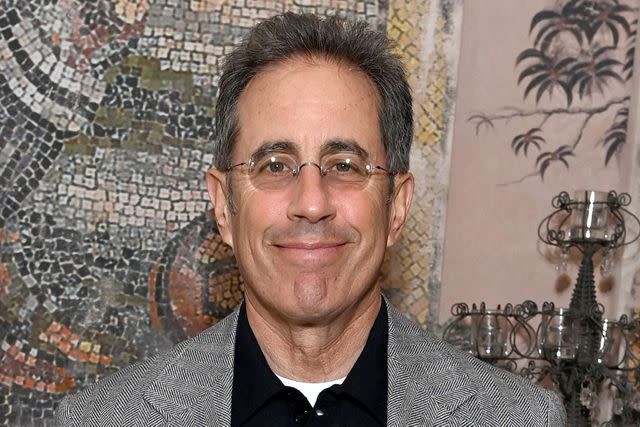Jerry Seinfeld blames 'extreme left' and 'PC crap' for lack of good comedy
- Oops!Something went wrong.Please try again later.
- Oops!Something went wrong.Please try again later.
- Oops!Something went wrong.Please try again later.
A good comedian's job "is to be agile and clever enough" to navigate changing cultural tastes, the comedian says.
Jerry Seinfeld may be one of the most famous funnymen of all time, but he doesn't think highly of the current state of comedy. In a new interview with The New Yorker editor-in-chief David Remnick for The New Yorker Radio Hour podcast, Seinfeld diagnosed what he sees as the current problems with trying to create funny movies and TV shows.
In both his standup comedy and his beloved self-titled sitcom, Seinfeld has made a career out of plumbing the humor of everyday life experiences. So when Remnick asked him how "the weight of the world" affects his work, Seinfeld basically disagreed with the premise. According to him, modern TV comedy thinks too much about worldly concerns, and not enough about getting a good laugh.
"Nothing really affects comedy. People always need it, they need it so badly and they don't get it," Seinfeld said. "It used to be, you would get home at the end of the day and most people would say, 'oh Cheers is on. MASH is on. Mary Tyler Moore is on. All in the Family is on.' You just expected, 'there'll be some funny stuff we can watch on TV tonight.' Well, guess what? Where is it?"

Dave Kotinsky/Getty
Jerry SeinfeldSeinfeld continued, "this is the result of the extreme left, and PC crap, and people worrying so much about offending other people. Now, they're going to see stand-up comics, because we are not policed by anyone. The audience polices us. We know when we're off-track, we know instantly and we adjust to it. But when you write a script and it goes into four or five different hands, committees, groups, there goes your comedy."
Remnick points out that Curb Your Enthusiasm, which recently concluded its 12th and final season on HBO, seems like an exception to that rule. After all, Seinfeld himself just did a guest appearance on the Curb finale, in a mocking tribute to Seinfeld's own much-criticized series finale. But the comedian says that Curb star Larry David, who also co-created Seinfeld, was immune to current cultural restrictions.
"Larry was grandfathered in," Seinfeld said. "He's old enough to say, 'I don't have to observe those rules, because I started before you made those rules."
But, Seinfeld argues, if David was a young up-and-coming comedy writer today who wanted to pitch a concept like the Seinfeld episode where Kramer hires homeless people to pull rickshaws, or Curb's classic send-up Israel/Palestine relations, he probably wouldn't have the creative freedom to do so.
"If Larry was 35, he wouldn't get away with the watermelon stuff and 'Palestinian Chicken,'" Seinfeld said. "HBO knows that's what people come for. But they're not smart enough to figure out, 'how do we do this now? Do we take the heat, or just not be funny?'"
Seinfeld has been on a press tour lately to promote his directorial debut Unfrosted, a starry Netflix film that fictionalizes the invention of the Pop-Tart. Along the way, he's also recently said that he still remembers a particular heckler from 1993, if you want to know how deep the connection can be between a standup comic and their audience. Seinfeld does see hope, for those comedians who are clever enough to navigate changing tastes.
"We wouldn't do that joke with Kramer and the rickshaws today. We would come up with another joke," Seinfeld said. "They move the gates, like in skiing. Your job is to be agile and clever enough that wherever they put the gate, you're gonna make the gate."
Listen to the full interview at The New Yorker Radio Hour.
Sign up for Entertainment Weekly's free daily newsletter to get breaking TV news, exclusive first looks, recaps, reviews, interviews with your favorite stars, and more.
Related content:
Jerry Seinfeld still thinks about a heckler from 30 years ago: 'That was a tough one'
Hugh Grant says working with Jerry Seinfeld on Unfrosted was 'grrreat'
Read the original article on Entertainment Weekly.

